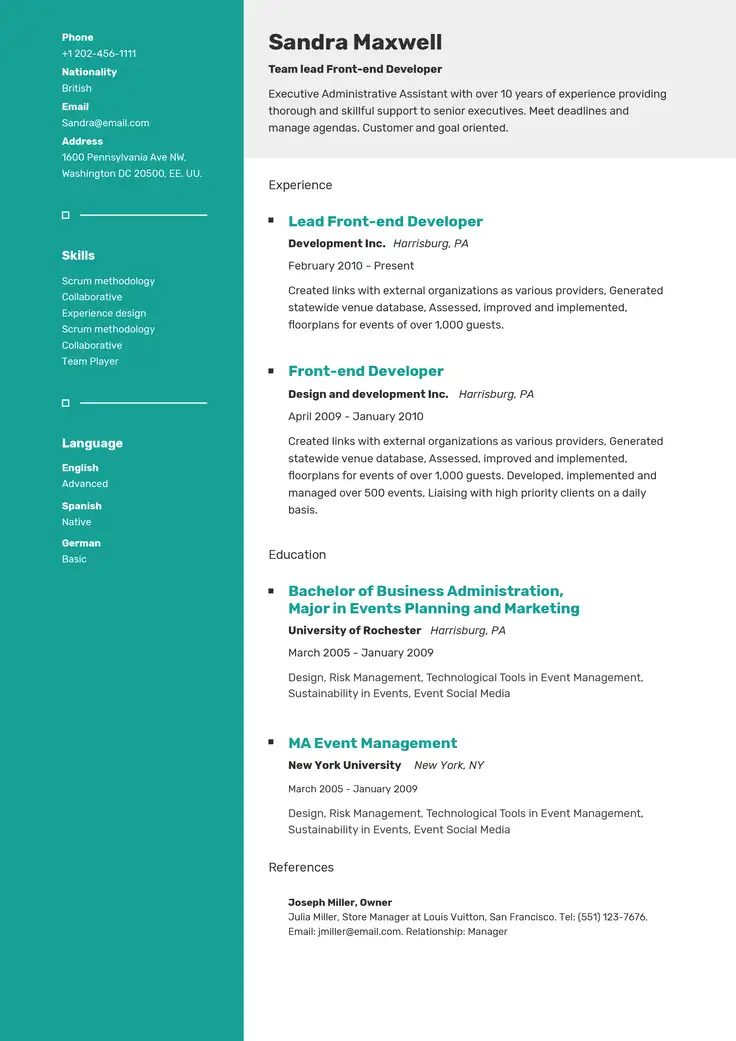Language Skills on the resume
How best to include your linguistic abilities.

Language skills are always impressive and for some jobs they are a requirement. How to include language skills on your resume will depend on whether they are relevant to the job, how many you speak, and to what level.
Your language skills are only a small part of your resume, so it’s vital that also you understand how to write a resume by each section.
Should I put languages on my resume?
The number one consideration on whether to include a resume language skills section is relevancy. Is the language a job requirement? Is the ability to speak the language of value to the company?
If the language is relevant to the position you’re applying for it should definitely be included, and highlighted. If not, it should be included though it shouldn’t be given too much prominence.
When writing a resume, space is precious, every part should help to sell yourself to the company. If you doubt whether something is relevant, the chances are it isn’t.
English is the most important international language to speak. Most recruiters and employers expect their employees to be able to hold a conversation in English.
However, the fact that your resume is in English will highlight this. In the US, it can also be highly valuable to speak Spanish. If you’re writing a student resume, extra languages look good, and will help you to fill the space.
Where to put language skills on a resume
A well-written resume should be tailored for each job application. The skills should match the job description, and each skill should be given prominence according to how important it is for the position. Resume language skills are no different.
With this in mind, you need to choose a place for putting languages on a resume. The most common choice is to feature them in your skills section. If you only speak one or two languages, and it isn’t directly important to the job, this is the most logical choice.
Unless you are applying for a job in IT, you can also put your computer skills in the same section under a general core competencies heading.
Another option, if you have a language qualification, is to list it under your education section.
If you’re applying for a job for which language skills are highly important, such as a translator or hospitality worker, you should choose a resume format which highlights them.
You should have a specific ‘languages’ section which gives more detailed information on your ability. It could be a subsection of your skills, or a separate section, whichever fits better.
You can also mention it in your ‘personal details’ section if you have one, and if it’s a must-have skill for the vacancy, you can plug it in your resume objective.
You should also include a separate ‘languages’ section if you speak enough languages to warrant doing so.
Using a resume template is an easy way to construct a winning resume which you can tailor for each position you apply for.
How to write foreign language skills on your resume
Once you’ve worked out where you’re going to put them, you need to know how to write language skills in a resume: Chinese, German, French or Spanish. What is your level? Are you fluent? Is your level intermediate?
How to write resume foreign language skills: There are lots of different scales and ways of measuring language ability. Unless the language ability is central to the job, you should just describe your level with one or two words.
Putting language proficiency on your resume: You can write something like basic, fluent or native or if you have a clearer idea of your level here is a scale of language ability:
Being fluent in a language is defined in a variety of ways, but essentially it means you can have a fluid and accurate conversation in that language.
Proficiency in a language means you understand it well, but may use it more formally or less easily than a fluent speaker.
If you’re at an intermediate level, you can have basic conversations in a variety of situations but still make your fair share of mistakes. Don’t bother including anything below this level on your resume.
Here is a basic level guide:
- Beginner (Don’t include)
- Elementary (Don’t include)
- Pre-intermediate (Don’t include)
- Intermediate
- Upper-intermediate
- Advanced
Alternatively you can use the scale which LinkedIn uses:
- Elementary proficiency (Don’t include)
- Limited working proficiency
- Professional working proficiency
- Full professional proficiency
- Native or bilingual proficiency
There are other options. If you have a qualification in a language you can include this in your ‘education’ or ‘qualifications’ section. You can also include the number of years you’ve studied it.
Do not lie on your resume about your language ability!
Don’t include language skills in a resume if you don’t have them! If the required language is important for the job you’re applying for, the interview – or at least part of it – is likely to be in that language. It could be incredibly awkward and embarrassing!
Even if you were to get away with it at the interview stage, you would be expected to be able to speak the language when you start the job. Once they discover that you can’t and that you lied on your resume, you could be sacked.
Secondly, if it is not an important element for the job, it won’t help your resume to stand out so it wouldn’t be of any help to you. Don’t lie on your resume!
If you have limited experience it can be tempting to lie. Don’t. Knowing how to write an entry-level resume will help you to highlight your strengths and get to the interview stage.

